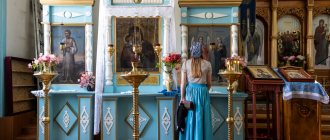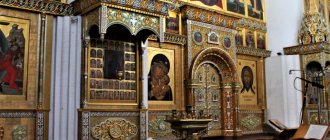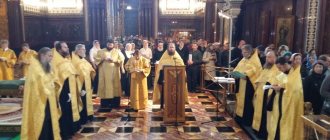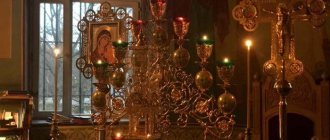Litany concept
Most Orthodox services include litany (prayer requests to God). The content and sequence of appeals is established by the Typikon.
In the Orthodox tradition, 8 varieties of litany are accepted (depending on the nature of the service):
- great - 12 petitions;
- extreme – 8 petitions;
- small – 3;
- pleading – 9;
- funeral;
- about the catechumens – 3;
- about the exit of the catechumens – 1;
- thank you – 3.
Sugubaya means that her petitions to God are read with special insight.
The small one is a shortened version of the great one, which contains calls:
- pray to the Lord;
- intercession, salvation, mercy from God by his grace;
- After remembering the Most Holy Theotokos and all the saints, surrender yourself to the will of the Lord.
The petition is read in 2 versions. Each petition ends with the words “...we ask the Lord.”
The funeral litany is great, small and triple. In the great funeral service, 13 petitions are read, in the small and triple ones - 3 petitions each, arbitrarily taken from the text of the great one.
How is it different from other prayer services?
The main difference is clear from the name, if you think about it, prayer is intense. This means that a person asks the gentlemen for something purely, that is, on purpose. As a rule, such prayers are dedicated to asking God for help in resolving a specific problem in the life of a person or his loved ones.
Another difference between this prayer service is that it is read by the clergyman in accordance with the need of the believer. This means that the more terrible and serious the problem, the more time in the service will be allocated for reading prayer.
Divine petitions and prayers
A special prayer-request addressed to God during the liturgy is called a special petition. It addresses the needs of specific people.
Prayer requests can be:
- about love;
- successful marriage;
- job search;
- solving material problems;
- children's health;
- forgiveness of the sin of artificial termination of pregnancy;
- people susceptible to evil spirits;
- about healing from illness;
- success in studies.
The request is submitted in the church shop in the form of a note signed “a special request.” It can only be given for those baptized into Orthodoxy. The notes are passed to the altar, where they are read by the priest during prayer at the proskomedia. When the deacon goes out for a special litany, he calls on all the laity in the church to join in prayer for the petitions submitted.
You can also ask God for help by ordering a private service (prayer service). Prayer services are ordered for the same reasons as special petitions. They are performed after the Liturgy or in the daytime, between services. The priest comes to the lectern and reads the opening prayers. This is followed by the reading of the canon to God, the Mother of God, the saints or the Orthodox holiday on that day. At the end of the prayer service, the priest reads out notes with names and sprinkles holy water on all those present in the church.
What kind of prayer is this?
In order to order a special prayer, it is not at all necessary to wait for the moment at which a tragedy occurs in life. It is enough just to feel the inner need for such prayer.
As a rule, a special prayer is read in connection with the needs of the following:
- admonishing children or loved ones, instructing them on the righteous path;
- spiritual and physical health;
- assistance in family matters and in preserving marriage;
- the granting of heirs and the birth of strong children;
- ability to learn, disclosure of talents;
- protection from evil intrigues and slander;
- healing from harmful passions.
Nowadays, women most often order a special prayer asking for peace of mind and forgiveness for the sin of infanticide. We are talking about abortion, because not every woman is able to mentally and emotionally endure this event.
Accordingly, such a prayer is a deep petition to the Lord about what is important to a person. There are no restrictions on the reason for it.
Serious Litany at the Liturgy
A special litany means that believers are called to pray, fully concentrating on turning to the Lord. The prayer consists of several short petitions, each of which is followed by prayerful exclamations from the choir. The choir acclamations “Lord, have mercy” sound three times after the second petition, enhancing the emotional background of the litany.
A special litany is a prayer for persons, a petitionary prayer is for things and needs that people need.
This form of worship has been known since the 10th-11th centuries, when the liturgy of the Apostle James contains a prayer similar in content to the modern strict litany. In essence, it is a repetition and addition to the great litany.
What kind of prayer is this?
Many have heard that there is a special prayer for health. Not everyone understands what it is, when and why it is needed. Meanwhile, deep prayer is a traditional type of component of the liturgy. It is pronounced at the personal request of the believer and can concern not only health, but also other life aspects or problems.
Prayer is ordered from clergy in any church, monastery or other parish. It will be read by the serving priest within the part of the liturgy specially designated for the needs of the parishioners.
Reading rules
The peculiarity of the service is that the litany is always read in roll call with the choir, whose responses to the deacon/priest’s appeals are called acclamations and can sound like:
- "Lord have mercy";
- "Give it, Lord"
- “To you, Lord”;
- "Amen".
From ancient services to the present day, the prayer is said by the deacon (the priest reads the prayer if there is no deacon on the clergy staff). The prayers are said slowly and drawn out, each accompanied by the sign of the cross and a bow from the waist.
| Deacon or priest: 1. We say everything with all our hearts and with all our thoughts. 2. Lord Almighty, God our father, we pray to Tis, hear and have mercy. These two petitions are not present at all types of daily Vespers and Matins (except for Matins on Holy Saturday). | Lord have mercy (1 time). Sings for every request. |
| 3.Have mercy on us, O God, according to Your great mercy, we pray to You, hear and have mercy. 4. We also pray for our great Lord and Father, His Holiness Patriarch (name), and for our Lord, Most Reverend Bishop (name) and for all our brethren in Christ. 5. We also pray for our God-protected country, its authorities and army, so that we may live a quiet and silent life in all piety and purity. 6. We also pray for the blessed and ever-memorable creators of this holy temple (also in the monastery: the holy monastery of sow), and for all the departed Orthodox fathers and brothers who lie here and everywhere. 7. We also pray for mercy, life, peace, health, salvation, visitation, forgiveness and forgiveness of sins of the servants of God, the brethren of this holy temple (also in the monastery: holy obi teli sow). 8. We also pray for those who are fruitful and virtuous in this holy and all-honorable temple, the working, singing and present people, who expect great and rich mercy from You. | - Lord, have mercy (3 times). Sings for every request. |
| The priest gives a shout. At Vespers, Matins and Liturgy: For You are a merciful and Lover of mankind, and we give glory to You, the Father, and the Son, and the Holy Spirit, now and ever and unto the ages of ages. At the prayer service: Hear us, O God, our Savior, the hope of all the ends of the earth, and of those who are in the sea far away: and be merciful, be merciful, O Master, for our sins, and have mercy on us. For You are a merciful and loving God, and we give glory to You, the Father, and the Son, and the Holy Spirit, now and ever, and unto the ages of ages. | Amen. |
Does anything need to be done?
The Lord Himself does not need any actions from man; God only needs faith. But the person himself often needs to do something, undertake something in his daily life.
It is easier for people to mentally join the ordered prayer act if they do:
- consecration of your home;
- comprehend the commandments and their daily actions;
- they remember the dead in church;
- ask for the health of loved ones in the temple;
- attend services;
- repent of sins - both involuntary and intentional.
Deliberate sin is the scourge of the soul of modern man. The point is that, knowing that an action is bad and goes against God’s commandments, a person commits it anyway. And then, as people say, “the cats are scratching at his soul.”
Often it is precisely such actions that lead to the need for custom prayer, specific or otherwise.
Text of the prayer service
The special litany consists of the following petitions:
Let us say to the Lord with all our souls and with all our thoughts: (then it will be explained exactly what we will say).
Lord Almighty, God of our fathers, we pray to You, hear and have mercy.
Have mercy on us, Lord, according to Your great goodness. We pray to You, hear and have mercy.
We also pray for all the Christ-loving army.
We also pray for all the soldiers, as defenders of the Faith and the Fatherland.
We also pray for our brothers, priests, priests, and all our brotherhood in Christ.
We also pray for our brothers in service and in Christ.
We also pray for the blessed and ever-memorable most holy Orthodox Patriarchs, and the pious kings, and the pious queens, and the creators of this holy temple, and for all the Orthodox fathers and brethren who lie before us, who lie here and everywhere.
We also pray for St. Orthodox Patriarchs, about the faithful Orthodox kings and queens; – about the always memorable creators of the Holy Temple; about all our deceased parents and brothers buried here and in other places.
We also pray for mercy, life, peace, health, salvation, visitation, forgiveness and forgiveness of sins of the servants of God to the brethren of this Holy Temple.
(In this petition we ask the Lord for bodily and spiritual benefits to the parishioners of the church where the service is being performed).
We also pray for those who are fruitful and virtuous in this holy and all-honorable temple, for those who work, sing and stand before us, expecting great and rich mercy from You.
We also pray for people: “fruit-bearing” (i.e., those who bring material and monetary donations for the liturgical needs in the temple: wine, oil, incense, candles) and “virtuous” (i.e., those who make decorations in the temple or donate to maintain the splendor in the temple, as well as about those doing some work in the temple, for example, reading, singing, and about all the people who are in the temple in anticipation of great and rich mercy).
What do clergymen advise?
Many clergy are puzzled by the attitude of their flock to custom prayer services. What worries priests is that, having ordered the reading of a prayer, many people consider their participation completed. That is, they do not consider it necessary to work on their own soul, to pray on their own, or even to do anything to correct the life situation for which the prayer was ordered.
This is a general trend that clergy everywhere are worried about. People lose spirituality and come to churches as if they were going to shops. This attitude is not only wrong, but also harmful. A prayer that the person who ordered it does not care about and does not trust in will not bring any benefit.
Important features of special petitions at the liturgy
In prayer appeals to saints, Orthodox believers ask them not for direct help, but for them to pray to God for them. In prayers and akathists addressed to saints, the text contains the words: “Pray to God for us.”
In the modern text of the special litany there may be petitions that are not always read at services. To the prayer “...for our brothers in service and in Christ” one can add: “...we pray for our brothers, priests and holy monks.” This edition refers to the Jerusalem service book, since the Venetian (common Eastern) edition made an inaccuracy by not including the word about the highest clergy in the text about the brotherhood.
Pure prayer: the text of the prayer, when and how to read it correctly, advice from priests
Prayer is the very thread that connects a person with the Lord.
It is not God who needs prayer; even without human requests, he knows what and who needs it. Prayer is necessary for the person himself; it gives him peace and confidence. It is prayer that gives strength and strengthens faith. This is the meaning of the phrase that what will be given to those who ask. There are quite a lot of prayers, and each of them has its own place and time. This does not at all mean that you need to memorize any texts and pronounce them in front of a certain image at a specific hour. This means that for each life event or situation in the church there are its own types of prayers, for example, for health or for repose.
Church councils
Special requests can be added to the prayers of the great, special, small and petitionary litanies:
- about the sick;
- about rescue from natural or man-made disasters;
- on the occasion of the start of studies;
- blessing of water;
- the arrival of the New Year;
- burials;
- remembrance of the dead.
But the text of such petitions cannot be arbitrary: it must be taken from prayer chants or receive the approval of the highest clergy. The litany cannot be “overloaded” with an excessive number of petitions, as well as a long list of names about health and salvation.
Orthodox liturgical practice allows you to read the funeral litany after the funeral with the prayer “God of spirits...”. Between litanies it is unacceptable to read the kontakion “Rest with the Saints.”
How long should you read such prayers?
The Lord hears only requests filled with sincere faith and spoken with hope; pure prayer is no exception.
Based on practice, clergy recommend reading during at least twelve liturgies. But sometimes you need to read a prayer for thirty or forty services. Its effectiveness depends on the spirituality of the person asking and, of course, on the sincerity of this person’s faith. Of course, there is also a dependence on the complexity of the life situation.
For example, if a prayer is ordered for deliverance from drug captivity of a loved one, then not twelve services will be required, but much more. Although the Lord is omnipotent, demonic temptations are also not weak, and the soul of a drug addict is in the devil’s captivity and often does not consider it necessary to leave him.
It is important to understand that it is not its effectiveness in the literal sense that depends on the timing of the prayer, but the spiritual strengthening of the person praying and the firmness of intentions. That is, this is a kind of self-hypnosis, as psychologists call such actions. Of course, the stronger a person’s faith and the firmer his conviction, the faster and easier he will get the desired result. After all, as they say, to those who ask, it is given.
Where can I order such a prayer?
The place does not matter, so that in a difficult life situation, prayer can help. Whether it be a monastery or a temple next to the house is not so important. The main thing is faith and conviction in your actions, as well as sincerity in your intentions. If a person orders prayer services, but at the same time continues to lead a sinful life, then such duplicity will not lead to anything good.
However, given that in our country most of the monasteries and temples were closed and, in principle, desecrated, the question of location matters. Before ordering a prayer service, you need to go to the temple and stay in it for some time, stand and listen to yourself. If this church is not particularly cozy mentally, you want to leave it, or even irritation sets in, then there is no need to order prayers in this church, regardless of which clergy work in it.
The temple, which has preserved the centuries-old energy, is felt immediately and unmistakably. In such a church, peace and tranquility comes to the soul, and when leaving the church, a person seems to glow from within. He smiles and is open to everything good and bright. It is in such a temple that you need to order prayer services.








